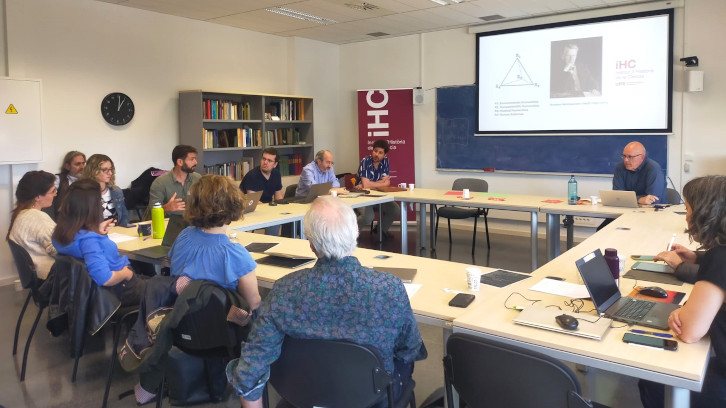Interdisciplinary stories: a scholarly dialogue between histories for environmental justice

The Institut d’Història de la Ciència (iHC) of the UAB hosted the seminar "Disciplinary crossroads: between the history of science and environmental history" on April 11-12. Organized by PhD students of the iHC, this event was a unique opportunity to bring together international experts and explore the connections between environmental history and the history of science, with the aim of addressing the challenges of environmental justice today.
The seminar entitled "Disciplinary crossroads: between the history of science and environmental history" took place on April 11 and 12 at the Institut d’Història de la Ciència (iHC) of the UAB. The event was organized by the Institute's PhD students Carolina Granado (iHC-UAB), Hèctor Isern (iHC-UAB) and Max Bautista-Perpinyà (UCLouvain), and brought together leading experts in the disciplines of history of science and environmental history from various universities and nationalities, including Lino Camprubí (Universidad de Sevilla), Sarah Dry (University of Cambridge), Sarah Hamilton (University of Bergen), Marco Armiero (Universitat Autònoma de Barcelona), Gregg Mitman (University of Wisconsin-Madison), Judit Gil-Farrero (Universidad de Zaragoza) and Santiago Gorostiza (Universitat Autònoma de Barcelona). The aim of the seminar was to explore the intellectual promiscuity between the two disciplines in the context of the current ecosocial crisis, while simultaneously addressing the challenges of environmental justice.
Environmental justice is a topic of growing relevance within the academic community, especially in the context of the current ecosocial crisis. However, environmental challenges are intrinsically complex and, therefore, it is essential to adopt multidisciplinary approaches that can develop narratives that allow us to understand this reality in all its dimensions.
In this context, the history of science and environmental history emerge as fundamental tools for providing essential insights into the evolution of human-environment relationships over time, as well as the impacts resulting from human actions and perceptions on the planet. However, despite sharing a wide range of topics, they have evolved as independent disciplines, with their own research communities. Nevertheless, their boundaries are permeable, and issues such as temporality, geographic scale, agency, political engagement, or controversies emerge as points of tension and dialogue among scholars.
With this purpose in mind, the seminar aimed to create a space conducive to explore possible forms of relationship between these two disciplines, considering them interconnected, in order to generate academic narratives and practices deeply committed to the protection of the environment.
The first day of the seminar started off with an introductory session led by the organizers and the director of the iHC, Carlos Tabernero, in which the motivation and organization of the event were explained. Professor Lino Camprubí then began the series of talks with a presentation of his research: the history of the oceans. He remarked that "the oceans are not silent, they are a territory where military, economic and political history has intervened throughout history", exemplifying the impact of the atomic bomb on the Pacific islands during World War II.
Historian Sarah Dry led a session focused on the importance of temporal factors in climate science and their links to activism. She stressed that "to make natural knowledge evident, the history of science is history of action, and telling the story of dynamic visions of climate change can be activism," addressing the need to build a historiography of activism to understand these dynamics. Sarah Hamilton then reflected on the different forms of environmental activism in the production and dissemination of scientific knowledge, highlighting the actors that make up political science. "We can consider scientists as translators of environmental contexts with a dual role, as policy makers and as activists" she pointed out. Thus, she continued, "if science is political, then the production of science is also political."
The day concluded with a joint session by Marco Armiero and Gregg Mitman, who explored academic disobedience and boundary crossing in their interdisciplinary intellectual trajectories, situating storytelling as a critical act and a type of activism.
The second day of the seminar was marked by the interventions of researchers Judit Gil-Farrero and Santiago Gorostiza, who reflected on the representations of nature in historical environmental conflicts. Gil-Farrero highlighted the different perception of these conflicts in rural and urban landscapes, stating that "rural people are marginalized from political power, as science does not consider this local knowledge to be allowed in the decision making that affects their landscapes". She illustrated this point with historical examples of the management of Catalonia’s national parks during the Franco dictatorship. Gorostiza explained how war and control of nature have evolved together throughout history. He stated that "both the impacts of the Spanish Civil War and those of the current conflict in the Ukraine represent an ecocide; nature is a silent victim of war".
Finally, the former director of the iHC, Agustí Nieto-Galán, shared his experience on the fruitful alliance between the history of science and environmental history at the UAB, highlighting the importance of historical interdisciplinarity as an essential tool in the management of environmental conflicts.
The event culminated with an open round table, in which both participants and the audience discussed the historiographical ideas that emerged during the seminar. This space for reflection addressed the personal challenges of multidisciplinarity in the construction of an academic identity, as well as the imperative need to create spaces in which academics at different stages of their careers can discuss issues related to environmental justice. In an inclusive and respectful environment and giving priority to underrepresented voices, all attendees actively participated in an exchange of ideas on the permeable boundaries between these two disciplines and recognized the critical importance of different perspectives in the understanding and conservation of the environment in current times.
Júlia Orrit González
Communication and Promotion Area
Universitat Autònoma de Barcelona

